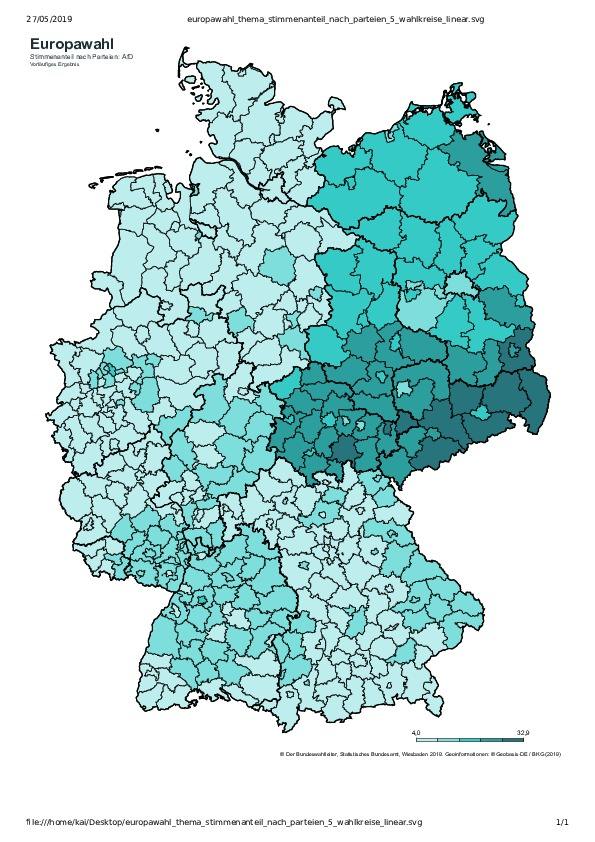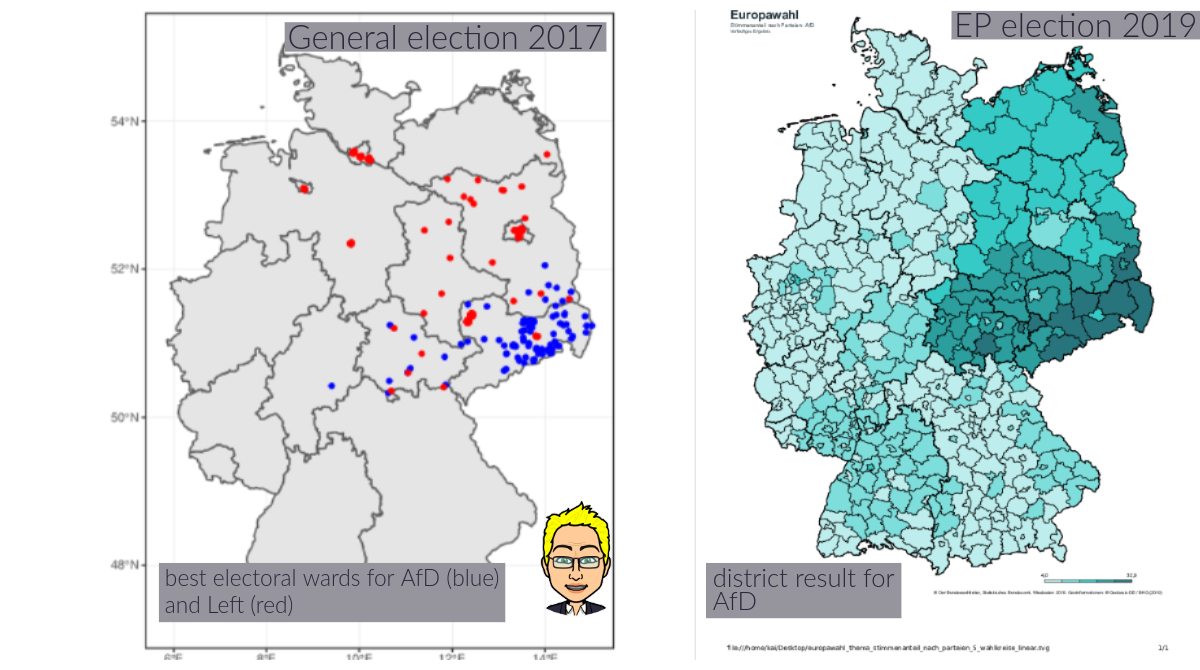How do people in cities & the countryside react to the presence or absence of immigrants? How does local decline further radical right mobilisation? Are immigrants becoming convenient scapegoats for developments that have nothing to do with them?
Or does the daily interaction between immigrants and the native population foster positive contacts that lead to pro-immigration attitudes? And what role do self-selection of liberal-minded individuals into multi-cultural neighbourhoods on the one hand and “white flight” on the other play?
- Arzheimer, Kai and Theresa Bernemann. “‘Place’ Does Matter for Populist Radical Right Sentiment, but How? Evidence from Germany.” European Political Science Review 16.2 (2024): 167-186. doi:10.1017/S1755773923000279
[BibTeX] [Abstract] [HTML]The notion of ‘place’ has become a central concern in research on the populist radical right (PRR), but scholars seem to have different things in mind when talking about how geography affects individual political attitudes. In our paper, we therefore aim to structure the debate on the impact of place and to understand exactly how place affects PRR attitudes (nativism, right-wing authoritarianism, and populism). Conceptually, we identify four potentially relevant aspects of ‘place’ that underpin much of the current literature: place-related attitudes (localism and resentment), place-specific living conditions, socio-demographic composition, and characteristics unique to a particular place, i.e., its local history and culture. We also discuss how these aspects are related and how they may interact. Empirically, we assess the relative importance of these four aspects of place for PRR sentiment in Germany, a country that is particularly well suited to this type of analysis. Using fine-grained geocoded survey data collected prior to the 2017 election, we find that (1) there is considerable spatial variation and clustering in PRR attitudes, (2) a place’s socio-demographic composition and (3) place resentment account for much of this, while (4) localism has weaker effects. We find (5) no relevant interaction between localism and place resentment, (6) no substantial evidence that mediation through place-related attitudes leads to an underestimation of the other aspects, and (7) no evidence for effects of the unique culture or history of the places we studied. Moreover, (8) location in the former GDR still has a substantial impact, whereas (9) other place-specific conditions (deprivation, demographic decline, migration, rurality) that could be addressed by policy interventions have no or rather weak effects. We conclude that PRR sentiment in ‘places that don’t matter’ results also, though by no means exclusively, from a lack of recognition.
@Article{arzheimer-bernemann-2023, author = {Arzheimer, Kai and Bernemann, Theresa}, title = {'Place' Does Matter for Populist Radical Right Sentiment, but How? Evidence from Germany}, journal = {European Political Science Review}, year = 2024, volume = {16}, number = {2}, pages = {167-186}, abstract = {The notion of 'place' has become a central concern in research on the populist radical right (PRR), but scholars seem to have different things in mind when talking about how geography affects individual political attitudes. In our paper, we therefore aim to structure the debate on the impact of place and to understand exactly how place affects PRR attitudes (nativism, right-wing authoritarianism, and populism). Conceptually, we identify four potentially relevant aspects of 'place' that underpin much of the current literature: place-related attitudes (localism and resentment), place-specific living conditions, socio-demographic composition, and characteristics unique to a particular place, i.e., its local history and culture. We also discuss how these aspects are related and how they may interact. Empirically, we assess the relative importance of these four aspects of place for PRR sentiment in Germany, a country that is particularly well suited to this type of analysis. Using fine-grained geocoded survey data collected prior to the 2017 election, we find that (1) there is considerable spatial variation and clustering in PRR attitudes, (2) a place's socio-demographic composition and (3) place resentment account for much of this, while (4) localism has weaker effects. We find (5) no relevant interaction between localism and place resentment, (6) no substantial evidence that mediation through place-related attitudes leads to an underestimation of the other aspects, and (7) no evidence for effects of the unique culture or history of the places we studied. Moreover, (8) location in the former GDR still has a substantial impact, whereas (9) other place-specific conditions (deprivation, demographic decline, migration, rurality) that could be addressed by policy interventions have no or rather weak effects. We conclude that PRR sentiment in 'places that don't matter' results also, though by no means exclusively, from a lack of recognition.}, html = {https://www.cambridge.org/core/journals/european-political-science-review/article/place-does-matter-for-populist-radical-right-sentiment-but-how-evidence-from-germany/7C639AAC5F6B1BC2F6324F7D57136827}, pdf = {https://www.cambridge.org/core/services/aop-cambridge-core/content/view/7C639AAC5F6B1BC2F6324F7D57136827/S1755773923000279a.pdf/place-does-matter-for-populist-radical-right-sentiment-but-how-evidence-from-germany.pdf}, doi = {10.1017/S1755773923000279} }
These are (I think) fascinating questions that have occupied me for a long time. Thanks to my fantastic colleagues in the SCoRE project, we are a bit closer to answering them. Tomorrow, we’ll present first findings and a couple of policy recommendations at an EPC event in Brussels. If you can’t/couldn’t make it to Belgium, watch this short video and read either the full policy brief or the executive summary.




